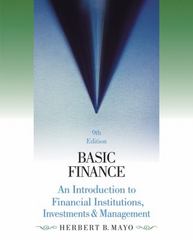Question
Despite some theoretical assertions, many investors do care a great deal about dividends. They believe that sure dividends today (a bird in the hand) are
Despite some theoretical assertions, many investors do care a great deal about dividends. They believe that sure dividends today (a bird in the hand) are less risky than a return in the form of capital gains in the future.
The following table lists some factors that might affect an investors preference for dividends. Indicate whether the given factors are likely to make an investor prefer to receive more or fewer dividends.
| Factor | Investors Will Likely Prefer... | ||
|---|---|---|---|
| More Dividends | Fewer Dividends | ||
| When investors receive dividends today, they may choose to reinvest or to consume goods. |
|
| |
| Risk-averse investors prefer to minimize uncertainty with their expectations of income from their investment. |
|
| |
| Dividends are taxed in the year in which they are received, whereas capital gains are taxed when the stock is sold. |
|
| |
In examining investors preferences for dividends, it is useful to begin with the concept of dividend irrelevance. Dividend irrelevance suggests that in a world with no taxes or brokerage (or transaction) costs, firms and investors are indifferent to the paying or receiving of dividends.
However, as these restrictions are relaxed, various factors suggest that firms should pursue high or low payouts. One such factor is:
Firms incur various legal and administrative costs (called flotation costs) when they issue new stock.
2. Based on the factor described, identify whether firms, in general, will tend to favor high or low payout ratios.
A. Favor a low payout
B. Favor a high payout
Erin and Mia are finance researchers and are discussing the Modigliani and Miller (MM) dividend irrelevance theory. Based on your understanding of MMs argument and the impact of the assumptions applied to the argument, fill in the missing parts of their conversation.
ERIN: Modigliani and Miller (MM) dividend irrelevance theory is based on several assumptions. However, in the real world, these assumptions dont apply.
MIA: True. If the transaction cost assumption is removed, then investors do care about how they receive their gains from their investmentcapital gains or dividends.
ERIN: You are right, Mia. According to MMs theory, investors who own low- or nondividend-paying stocks could sell or buy their holdings to satisfy current income requirements.
MIA: But in the real world, Erin, this is not a fair assumption. Transaction costs with each trade activity will decrease or increase the investors earnings leading investors toward preferring regular dividends.
Step by Step Solution
There are 3 Steps involved in it
Step: 1

Get Instant Access to Expert-Tailored Solutions
See step-by-step solutions with expert insights and AI powered tools for academic success
Step: 2

Step: 3

Ace Your Homework with AI
Get the answers you need in no time with our AI-driven, step-by-step assistance
Get Started


